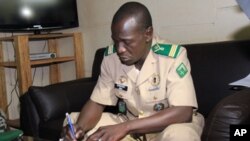A prominent politician in Mali says the ongoing military crisis is a distraction to the aim of restoring constitutional rule in the West African nation.
Niankoro Yeah Samake, leader of the Party for Patriotic and Civic Action (PACP) called for unity among sections of the military after he expressed disappointment with division among the rank and file of the army.
“We should not lose focus of where Mali is today and where we need to take Mali to…We are at a time where we need to unify the Malian army to take on the challenges [and] to protect the territorial integrity of the country,” said Samake.
“We call on the leader of the junta to be the leader of the army as we work hard with the international community, the political parties the civil society in Mali to restore democracy for the benefit of the people of Mali.”
Samake’s comments came after soldiers who support the junta took control of the main base for troops loyal to ousted President Toumani Toure after a second day of heavy fighting following Monday’s attempted counter coup d’état.
Coup leaders said in a televised statement Tuesday that they remain in control of key sites in the capital, Bamako. They described the fighting as an attack by ill-intentioned people set on destabilizing Mali's transition to constitutional order.
Meanwhile, regional heads of states and government are scheduled to attend an Economic Community of West African States (ECOWAS) summit Thursday. Officials say the leaders will review the current situation in Mali. The summit will be held in the Senegalese capital, Dakar.
Coup leaders in Mali have rejected an ECOWAS proposal to restore constitutional order. They accused the regional bloc of not keeping its part of the agreement it signed with the junta.
Samake said Malians should be allowed to lead the effort to resolve the country’s challenges.
“Mali needs its partners, but we need to make sure that this is a Malian solution. We cannot make this solution outside of Mali [because] that will be an imposition. We don’t want that and it is not going to be a lasting solution,” said Samake.
“The people of Mali need to come together and define the terms of how the country should be run during the transition.”
Samake said his party, together with 14 other political parties, have outlined what he said would be the best possible solutions to resolving the crisis in Mali.
“What we said is that there is a need to organize a convention [and] to put in place a national transitional committee with 30 people- seven military, 18 political leaders and five [from the] civic society. And these 30 people will elect among them the president of the transitional power, excluding any military officials,” said Samake.




